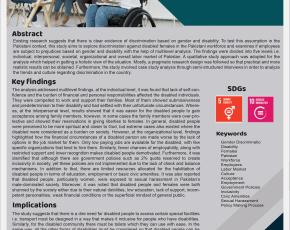Abstract
Existing research suggests that there is clear evidence of discrimination based on gender and disability. To test this assumption in the Pakistani context, this study aims to explore discrimination against disabled females in the Pakistani workforce and examines if employees are subject to prejudices based on gender and disability with the help of multilevel analysis. The findings were divided into five levels i.e. individual, interpersonal, societal, organizational and overall labor market of Pakistan. A qualitative study approach was adopted for the analysis which helped in getting a holistic view of the situation. Mostly, a pragmatic research design was followed so that practical and more realistic results can be obtained. Furthermore, the study involved case study analysis through semi-structured interviews in order to analyze the trends and culture regarding discrimination in the country.
Key findings
The analysis addressed multilevel findings, at the individual level, it was found that lack of self-confidence and the burden of financial and personal responsibilities affected the disabled individuals. They were compelled to work and support their families. Most of them showed submissiveness and predeterminism to their disability and had settled with their unfortunate circumstances. Whereas, at the interpersonal level, results showed that it was easier for the disabled people to gain acceptance among family members, however, in some cases the family members were over-protective and showed their reservations in giving liberties to females. In general, disabled people were perceived to be more spiritual and closer to God, but extreme cases also existed where the disabled were considered as a burden on society. However, at the organizational level, findings highlighted how the financial circumstances of a disabled person are made worse by the lack of options in the job market for them. Only low paying jobs are available for the disabled, with few specific organizations that tend to hire them. Similarly, fewer chances of employability, along with restricted support and lower recognition makes disabled people demotivated. Furthermore, it was identified that although there are government policies such as 2% quota reserved to create inclusivity in society, yet these policies are not implemented due to the lack of check and balance mechanisms. In addition to that, there are limited resources allocated for the habilitation of disabled people in terms of education, employment or basic civic amenities. It was also reported that disabled people, particularly women, were exposed to sexual harassment in Pakistan’s male-dominated society. Moreover, it was noted that disabled people and females were both shunned by the society either due to their natural debilities, low education, lack of support, incompetent personalities, weak financial conditions or the superficial mindset of general public.
Implications
The study suggests that there is a dire need for disabled people to access certain special facilities i.e. transport must be designed in a way that makes it inclusive for people who have disabilities. Similarly, for the disabled community there must be toilets which they can use with ease. In the same way, all the other forms of disabilities must be considered so that disabled people can be integrated into the community as equal individuals in as many rights and merits as possible. Similarly, it is crucial to include disabled people in the decision-making processes, especially when those decisions affect them and their lives. It was evident from the findings that people with disabilities did not have an equal voice in the political or policymaking process. Including them in such processes will make it possible to devise policies that help the disabled people feel more valued and accepted in society.













